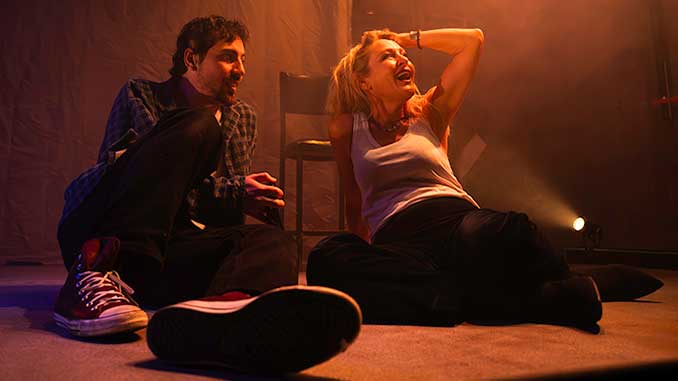 ‘Memory’, director Tom Healey writes in the program notes for Red Stitch Theatre’s searing new production of Blackout Songs by Joe White, ‘is our insurance against the repetition of history’. Without such insurance, by Healey’s logic, we’re doomed to repeat ourselves.
‘Memory’, director Tom Healey writes in the program notes for Red Stitch Theatre’s searing new production of Blackout Songs by Joe White, ‘is our insurance against the repetition of history’. Without such insurance, by Healey’s logic, we’re doomed to repeat ourselves.
This nihilistic idea is as good as summary as there could be for White’s show: a two-hander that follows doomed lovers Him (Jack Twelvetree) and Her (Sarah Sutherland) over 100-minutes as they play out the same fights, meet-cutes, and break ups with only the faintest memory of having done it all before. Heart-breaking and eye-catching, it is an arresting portrait of toxic love, if a less effective depiction of alcohol addiction.
‘I’ll forget soon enough’, Sutherland says early on, with a wink. The couple share what is known as Korsakoff syndrome, a form of dementia induced by alcoholism. The tragedy of their mutually destructive love affair is that they never quite forget each other enough to move on.
There is always a whisper of feeling; the faint echo of that first high that keeps them coming back for more. That White wrote the show while grieving the end of a relationship seems unsurprising; the show is structured like someone reflecting on a breakup, each scene combing over the same fights, conversations and misremembered details from different viewpoints, dogged by the fear (and inevitability) of repeating the same mistakes.
It all begins with a meet cute in line for coffee at an A.A. Meeting (or something like it). Sutherland, lithe and flirtatious, recognises the symptoms of alcohol withdrawal in Twelvetree’s clammy hands and shaking body (not to mention a surreptitious neck brace). After a few awkward ice breakers they head to Sutherland’s apartment for ‘medicine’; their shared addiction adding fuel to what will amount to years of co-dependency.
Blackout Songs is the perfect show for Red Stitch Theatre. White’s rich script affords Sutherland and Twelvetree ample opportunity to flex their dramatic muscles. Sutherland is unsurprisingly magnetic to watch. Snaking across the stage, or tousling her long blonde hair, she is self-assured but fragile as Her; the bubbly failed poet buoyed by intergenerational wealth.
Every confident witticism bellies a vulnerability Sutherland emphasises with the subtle hunch of her back or stumbling walk. Twelvetree has the more physically demanding role, stuck in a near-constant state of writhing or itching. His boyish innocence and dry wit injects the failed artist, Him, with a touching likeability that adds a heart-wrenching poignancy to the show’s tragedy.
Though its title might suggest something of a song cycle, the show returns to eye-catching moments of dance and movement constantly. When Twelvetree begins rolling beneath Meri Blazevki’s AV design – whether grayscale static or ink-like blotches – in the throes of withdrawal, the show creeps closer to the abstract powers of tanztheatre, something I found myself craving more of.
Director Tom Healey has instead opted for a near-Brechtian conceit, placing his actors on a stage surrounded by floodlights as if about to perform a Punch and Judy set. The set (enigmatic design from Chiara Wenban who also does costumes) is a combination of graffiti, exposed panelling, construction signs and hooks side stage for the actor’s costumes.
It’s the kind of underground grunge aesthetic that feels reminiscent of the heyday of post-dramatic theatre – the metatheatricality of Brecht meets Sarah Kane. Props gather at the front of the stage; wine bottles, a neck brace and dead flowers filling the space between floodlights. Meanwhile, projections in cursive tell us, if you manage to read them in time, where and when we are: ‘Her bedroom’, ‘Meeting Room’, ‘Church’, ‘Purgatory’.
It’s an interesting choice and it amplifies the show’s investment in blurring the lines between what is real and imagined; making it also a line between what is theatre and what is reality. ‘Is this real?’, Twelvetree repeats throughout. But White’s script can’t quite sustain these choices, no matter how arresting or conceptually resonant they are.
Despite needing a careful edit, various threads – why the pair are drawn to alcohol in the first place, the import of Her’s religious beliefs or the systemic problems that make it hard for them to seek treatment – are given short thrift in the script in contrast to the show’s engagement with their relationship.
In the end, White feels more confident exploring relationship dynamics than he does three-dimensional complexities of alcoholism. Healey’s emphasis on bold stage craft and metatheatre seems like an attempt to answer this weakness, and it almost works.
Close-ups of tear-stained eyes, or the drunk-like distortion of underscoring (J.David Franzke’s sound design is suitably brooding) and a line of wine bottles hauntingly placed at the front of the stage are effective reminders of the all-consuming nature of their shared addiction.
As it stands, White’s script can’t quite rise above the limits of its own conceit. As scenes, moments, fights and meet-cutes repeat over the course of the show, they lose, rather than gain, effectiveness. It speaks more to the skills of these actors and the strength of stage craft that the show still manages to be affecting despite these limits.
By the end of this enigmatic production I was reminded of Hegel’s infamous declaration that “The only thing we learn from history is that we learn nothing from history”. If we could only remember what it was we were meant to learn.
Blackout Songs
Red Stitch Actors’ Theatre, Rear 2 Chapel Street, St Kilda East
Season continues to 30 June 2024
Information and Bookings: www.redstitch.net
Image: Jack Twelvetree and Sarah Sutherland – photo by James Reiser
Review: Guy Webster
